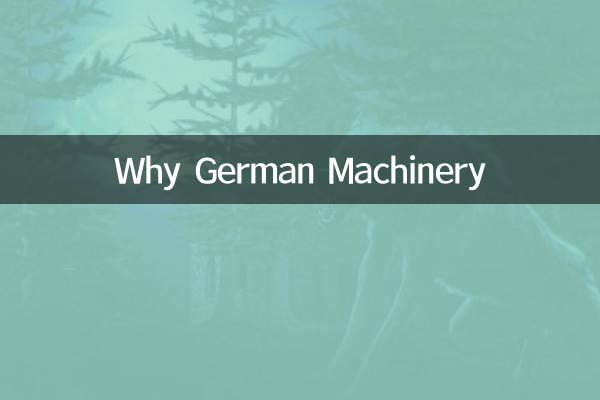Why is German machinery famous all over the world? Uncover the secrets behind its excellence
German machinery manufacturing has long been regarded as a benchmark for the global industry, winning worldwide acclaim for its precision, reliability and innovation. So why are German machines so good? This article will reveal the secrets behind German mechanical excellence from the aspects of historical origins, technological advantages, education system and corporate culture.
1. Historical origins: profound industrial tradition

The excellence of German machinery manufacturing industry is not achieved overnight, but stems from its profound industrial tradition. The Industrial Revolution in the 19th century laid a solid industrial foundation for Germany, especially in the field of machinery manufacturing. German companies such as Siemens, Bosch, Daimler and other century-old companies still occupy an important position in the global market.
| German mechanical milestone | time | influence |
|---|---|---|
| first internal combustion engine | 1876 | laid the foundation for the automotive industry |
| CNC machine tool technology | mid 20th century | Promoted the development of global precision manufacturing |
| Industry 4.0 Strategy | 2011 | Leading the global smart manufacturing trend |
2. Technical advantages: craftsmanship of excellence
The core competitiveness of German machinery lies in its craftsmanship spirit of excellence. German engineers are almost demanding in their pursuit of details, striving for perfection in every aspect from design to production. This spirit makes German machinery far superior to its competitors in terms of precision, durability and efficiency.
| German mechanical technology advantages | Specific performance |
|---|---|
| Precision manufacturing | Error controlled at micron level |
| Materials Science | High strength alloys and composite applications |
| Automation technology | Robot integration and smart production lines |
3. Education system: equal emphasis on theory and practice
Germany's unique education system has supplied a large number of high-quality talents to the machinery industry. Germany's dual education model perfectly combines school theoretical education with corporate practical training, allowing students to quickly adapt to their jobs after graduation.
| German mechanical education system | Features |
|---|---|
| dual education | Theory + practice, seamless connection |
| Engineer training | Pay attention to innovation and problem-solving abilities |
| lifelong learning | Ongoing vocational training and skills upgrading |
4. Corporate Culture: Quality is better than quantity
German companies generally adhere to the business philosophy of "quality over quantity". Rather than maximizing short-term profits, they focus on long-term product reliability and customer satisfaction. This culture has allowed German machinery to establish an unbreakable reputation in the market.
| German machinery corporate culture | performance |
|---|---|
| long term orientation | Pay attention to R&D investment and continuous improvement |
| Customer first | Customized solutions and quality services |
| sustainable development | Environmentally friendly technology and efficient use of resources |
5. Global Impact: Market Performance of German Machinery
German machinery performs well in the global market and dominates particularly in high-end manufacturing. Here is recent market data:
| field | market share | Representative enterprises |
|---|---|---|
| industrial robot | About 20% globally | KUKA |
| Machine tool manufacturing | About 16% globally | TRUMPF |
| automobile manufacturing equipment | About 30% globally | Dürr |
Conclusion: The success of German machinery
The success of German machinery is the result of a combination of factors: a long industrial tradition, rigorous craftsmanship, a sound education system, a quality-focused corporate culture, and continuous investment in innovation. These factors promote each other to form a benign ecosystem that allows German machinery to maintain its leading position in the global market.
For Chinese companies, in order to learn from the successful experience of German machinery, they cannot simply imitate its technology and products, but also need to learn from the thinking and management concepts behind them. Only by building on a solid industrial foundation and continuous innovation can we achieve true transformation and upgrading and occupy a place in the global high-end manufacturing field.

check the details

check the details